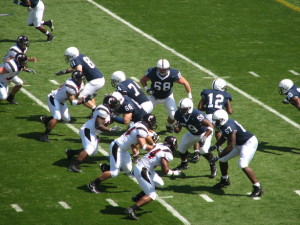October 31, 2019

On October 29, 2019, the National Collegiate Athletics Association’s (“NCAA”) Board of Governors unanimously voted to consider allowing student-athletes to benefit from the use of their names and likenesses. The NCAA has long restricted collegiate athletes from controlling how their respective names, images and likenesses are used. Now, however, the Governors of the NCAA have directed each of the three NCAA Divisions to consider updating their bylaws in “a manner consistent with the collegiate model.” While this decision is merely the first step towards a new policy, it could have huge implications for NCAA marketing across a variety of media.
Why has the NCAA changed its position?
Current NCAA Rules
The decision comes after California passed legislation effectively banning the NCAA’s prohibition on students benefitting from their fame. Many states allow individuals to profit from the use of their names, images and likenesses – recognizing the individual’s “right of publicity.” The NCAA has traditionally prohibited student-athletes from commercially exploiting these publicity rights. This has long proved controversial, as NCAA marketing rules have allowed everyone from t-shirt manufactures to video game producers to profit from using an athlete’s likeness. Meanwhile, this revenue never found its way to student-athletes. Athlete grievances were spotlighted in the 9th Circuit’s high profile decision in the O’Bannon case, which upheld the NCAA’s ban despite finding that NCAA practices violated antitrust laws. Now, the NCAA appears to have seen the writing on the wall. By working toward a unified regime, it hopes to avoid a patchwork of laws across the country.
Potential Impact of New NCAA Marketing Rules
Is the NCAA now paying mere lip service to the idea of monetizing publicity rights for student-athletes or will there be meaningful change? The NCAA’s announcement does not lay out any specifics for how a future system might be implemented, and the NCAA has not committed to implementing any changes in their existing rules. Rather, each of the three NCAA Divisions were merely directed to “consider” changing their bylaws. Each Division must create new rules (if any) by January 2021.
While the announcement is short on details, it does seem that the NCAA will continue to prohibit student-athletes from being directly compensated “for athletics performance or participation.” It is unclear how an athlete might benefit from the use of her/his likeness, if she/he cannot be paid directly. However, the NCAA is adamant that collegiate athletes continue to be differentiated from professional athletes. Indeed, the NCAA’s legislative working group report recommended that any name, image, or likeness benefits be tethered to the particular student-athlete’s education.
Given the vagueness of the announcement, it is unclear how new Division bylaws would affect NCAA marketing practices. However, observers should assume that the NCAA will take action and that new bylaws are forthcoming. Even small changes to NCAA marketing rules could have a huge effect on how a wide variety of media businesses use the names, images, and likenesses of student-athletes. Notwithstanding the foregoing, we expect that the ultimate NCAA marketing rules will be nuanced and require careful analysis. It is, therefore, important for companies to work with experienced attorneys to ensure compliance with the new NCAA bylaws, as well as all relevant state and federal laws and regulations. If you need assistance developing or reviewing a sports marketing campaign, please e-mail us at info@kleinmoynihan.com, or call us at (212) 246-0900.
The material contained herein is provided for informational purposes only and is not legal advice, nor is it a substitute for obtaining legal advice from an attorney. Each situation is unique, and you should not act or rely on any information contained herein without seeking the advice of an experienced attorney.
Attorney Advertising
Similar Blog Posts:
California Fair Pay to Play Act and College Athlete Marketing
The Impact of the O’Bannon Ruling on the Collegiate Athletics Commercial Market and Fantasy Sports
Appeals Court: Don’t Pay Student-Athletes, Though NCAA Does Violate Antitrust Laws



